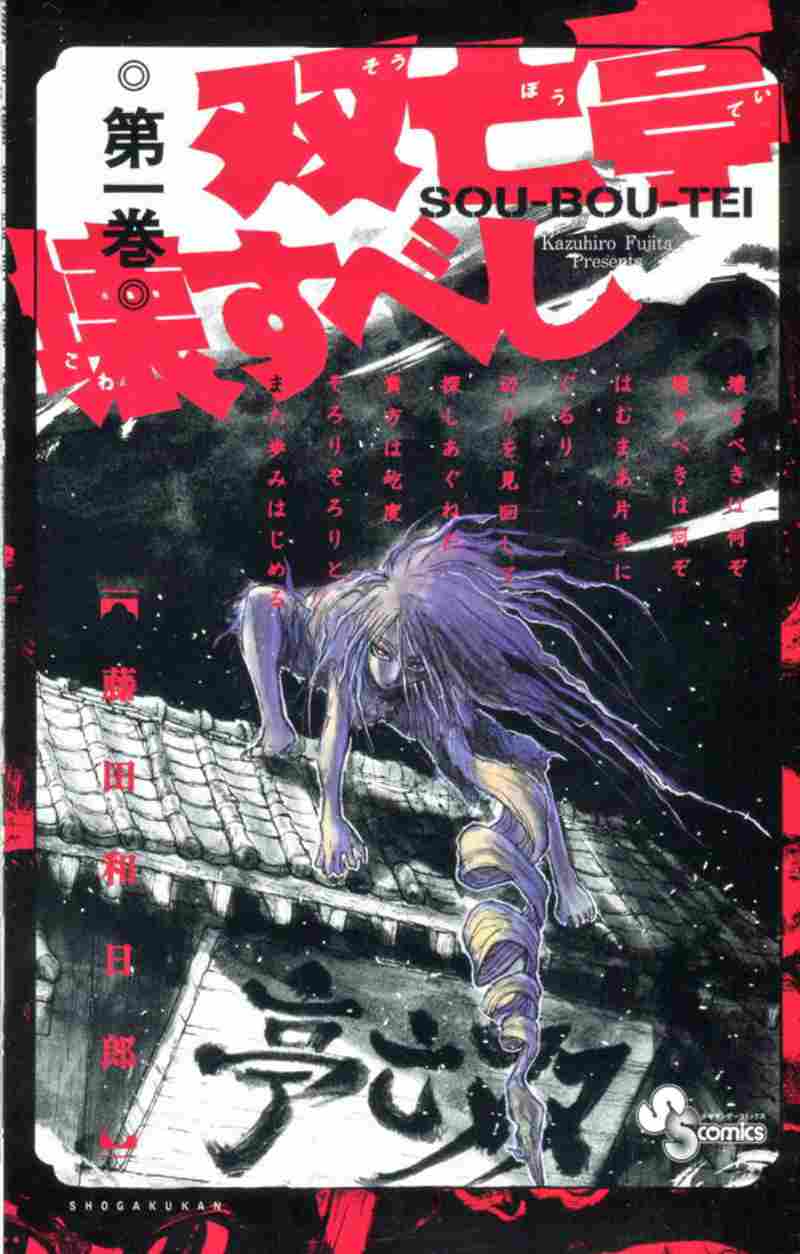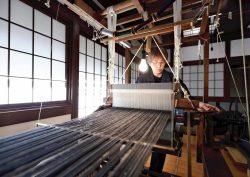
The cover of the first volume of “Sou-bou-tei Kowasubeshi”
November 19, 2021
I would once again like to take up another big name mangaka that I haven’t yet introduced in this column: Kazuhiro Fujita. His manga “Sou-bou-tei Kowasubeshi” (Sou-bou-tei should be destroyed) was serialized for five years in the Shukan Shonen Sunday weekly manga magazine for boys. The 25th and final volume of the series in book form was recently published by Shogakukan.
Fujita made his debut in 1988, which means he started as a mangaka eight years after Hirohiko Araki, who was featured in my previous column. Fujita and Araki were leaders in the field of action-packed horror manga during the Heisei era (1989-2019).
Modern-day horror stories, in which absurd and occult mysteries overtake ordinary life, have been popular globally since the 1970s, thanks to the U.S. writer Stephen King. His influence in Japan was more prominent in manga than in novels. And the two greatest mangaka of modern horror, in terms of quality and quantity, are Araki and Fujita.
Fujita’s manga are defined by having passion that is characteristic of boys’ manga, as well as a robust and dramatic structure. His superb storytelling skills are unrivaled.
Take his debut manga, “Ushio to Tora” (Ushio & Tora), a feature-length work about a boy becoming buddies with a cannibalistic monster, or “Karakuri Circus” about a herd of automatons attacking humans, Fujita’s fantastic and bizarre stories balloon and expand endlessly until, all of a sudden, everything seems to stack up and fall neatly into place at the very end. Moreover, his manga always have a happy ending.
If Araki’s style is like the moon — somewhat secretive and cool — Fujita’s is like the sun, boldly proclaiming justice and courage. However, the two certainly make a good match when it comes to the depiction of extreme violence.
The subject of “Sou-bou-tei Kowasubeshi” is a haunted house. Sou-bou-tei, a house located somewhere in Tokyo, terrifies people because no one that enters it ever comes out. The Japanese prime minister, who lost a childhood friend to the house, carries out an airstrike on the house using the Self-Defense Forces, but the structure remains completely undamaged. Next, he decides to destroy it from within and dispatches a special team comprising members with supernatural powers as well as paranormal-phenomena-task-force professionals. The team somehow also includes Takoha, an unsuccessful picture book artist.
The story structure is surprisingly simple for Fujita. Takoha and other main characters who enter the house in the second volume of the manga cannot get out until the 25th and final volume. Battle action galore unfurls to save humanity, all within this minimum and enclosed space, and extends beyond the Earth and into the universe. I have nothing but praise for Fujita’s ability to create drama.
Among professionals with supernatural powers, protagonist Takoha is the only “ordinary” person who has no special ability. His weapon is his cheerful bravery, which is contagious, and his passion for drawing. It becomes apparent at an early stage in the manga that the owner of the house is also an eccentric artist.
Sorry for being a spoilsport, but the climax is a clash between the protagonist and the haunted house owner over artistic sensibilities. Fujita seems to reveal his own cherished manga philosophy through Takoha.
To be honest, I think this manga digresses too often, and the ending feels somewhat unreasonable and forced. But then again, the beautiful denouement that basks readers in a warm afterglow compensates for any faults and is a prize to be treasured.
— Kanta Ishida, Yomiuri Shimbun Senior Writer
Top Articles in Culture
-

BTS to Hold Comeback Concert in Seoul on March 21; Popular Boy Band Releases New Album to Signal Return
-

Director Naomi Kawase’s New Film Explores Heart Transplants in Japan, Production Involved Real Patients, Families
-

‘Jujutsu Kaisen’ Voice Actor Junya Enoki Discusses Rapid Action Scenes in Season 3, Airing Now
-

Tokyo Exhibition Offers Inside Look at Impressionism; 70 of 100 Works on ‘Interiors’ by Monet, Others on Loan from Paris
-

Traditional Japanese Silk Hakama Tradition Preserved by Sole Weaver in Sendai
JN ACCESS RANKING
-

Japan PM Takaichi’s Cabinet Resigns en Masse
-

Japan Institute to Use Domestic Commercial Optical Lattice Clock to Set Japan Standard Time
-

Israeli Ambassador to Japan Speaks about Japan’s Role in the Reconstruction of Gaza
-

Man Infected with Measles Reportedly Dined at Restaurant in Tokyo Station
-

Videos Plagiarized, Reposted with False Subtitles Claiming ‘Ryukyu Belongs to China’; Anti-China False Information Also Posted in Japan

























